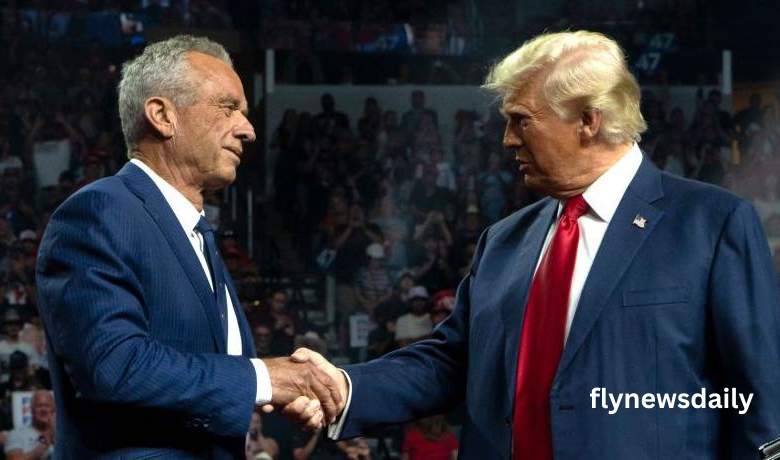
In a move that has left both political analysts and healthcare professionals reeling, former President Donald Trump has reportedly named Robert F. Kennedy Jr., a known vaccine skeptic, as the United States Health Secretary. This unprecedented decision has sparked nationwide debate, with reactions ranging from staunch support to vehement criticism. Below, we delve deep into the implications, controversies, and potential impacts of this monumental appointment.
Who Is RFK Jr. and Why Is He Controversial?
Robert F. Kennedy Jr., the nephew of President John F. Kennedy and son of former Attorney General Robert F. Kennedy, has long been a prominent figure in American politics and activism. Known for his environmental advocacy, Kennedy shifted focus over the years to public health, specifically targeting vaccines.
A Legacy of Activism
Kennedy’s advocacy began with his work on environmental issues, particularly against pollution caused by corporations. However, his stance on vaccines and public health policies has placed him at the center of heated debates. He has frequently criticized vaccine mandates and questioned vaccine safety, despite overwhelming scientific consensus to the contrary.
Controversy Surrounding Vaccine Skepticism
Kennedy has been a vocal critic of the pharmaceutical industry, alleging corruption and lack of transparency. His positions have earned him support from segments of the population wary of government overreach, but they have also drawn sharp criticism from the medical community and public health experts.
Why Did Trump Choose RFK Jr. for Health Secretary?
Donald Trump’s decision to appoint RFK Jr. as Health Secretary appears to be a calculated political move aimed at galvanizing a specific segment of his base. Trump, who has often aligned himself with controversial figures to challenge the establishment, likely sees Kennedy as a symbol of rebellion against traditional norms.
Appealing to the Anti-Vaccine Movement
By appointing a vaccine skeptic, Trump is appealing to a growing faction of Americans who oppose vaccine mandates. This move could strengthen his support among voters who feel disenfranchised by mainstream medical narratives.
A Challenge to Big Pharma
Trump’s past criticisms of the pharmaceutical industry align with Kennedy’s outspoken views. The appointment signals a continued challenge to what both figures perceive as unchecked corporate power in the healthcare sector.
Potential Impacts on Public Health Policy
The appointment of RFK Jr. raises critical questions about the future of public health in the United States. Kennedy’s views on vaccines and other public health issues could lead to significant shifts in federal health policy.
Reevaluation of Vaccine Policies
Kennedy’s history suggests he may push for increased scrutiny of vaccine safety protocols. While advocates argue that such measures could enhance transparency, critics warn they could undermine public confidence in life-saving vaccines.
Impact on Pandemic Preparedness
Public health experts fear that Kennedy’s leadership could hinder efforts to combat future pandemics. His controversial stance on vaccine mandates might weaken government initiatives to ensure widespread immunization during outbreaks.
Funding for Public Health Programs
Kennedy’s skepticism of the pharmaceutical industry could influence budget allocations for health programs. He may advocate for reallocating funds from vaccine campaigns to alternative public health initiatives.
Public and Expert Reactions
The announcement has elicited polarized reactions across the political and social spectrum.
Support from Advocates
Kennedy’s supporters hail the appointment as a victory against what they perceive as authoritarian health policies. They argue that his leadership will promote individual choice and challenge corporate monopolies in healthcare.
Criticism from Medical Professionals
Medical associations and public health experts have expressed alarm, warning that Kennedy’s views could endanger public health. Organizations like the American Medical Association have emphasized the importance of evidence-based policies to protect communities.
Political Fallout
Trump’s decision has also sparked division within his own party. While some Republicans support the move as a bold stance against the establishment, others fear it could alienate moderate voters.
The Broader Political Implications
Beyond public health, the appointment of RFK Jr. carries significant political implications. It reflects Trump’s broader strategy of aligning with polarizing figures to energize his base.
Strengthening the Anti-Establishment Narrative
Trump has consistently positioned himself as an outsider challenging the status quo. By appointing Kennedy, he reinforces this narrative, appealing to voters who feel disillusioned with traditional politics.
Impact on the 2024 Presidential Race
The appointment could influence Trump’s standing in the 2024 presidential race. While it may energize his base, it also risks alienating independents and moderate conservatives.
Conclusion
Trump’s decision to appoint RFK Jr. as Health Secretary marks a dramatic shift in U.S. public health leadership. While the move has garnered support from vaccine skeptics and anti-establishment voters, it has also raised serious concerns about the future of evidence-based health policies. As the nation grapples with the implications of this appointment, one thing is clear: the debate over public health and personal freedom is far from over.



